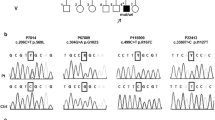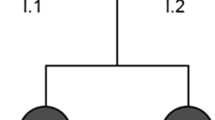Abstract
Hereditary spastic paraplegias (HSPs) include a group of neurodegenerative diseases, and so far 46 SPG loci have been mapped and 17 genes isolated. Among the autosomal dominant HSPs (AD-HSPs), SPG10 is a rare form due to mutations in KIF5A gene (locus 12q13.3). We describe the clinical, neurophysiological, morphological and genetic study of an Italian family with AD-HSP. The proband presented with an adult onset spastic paraparesis and diffuse paresthesias where neurophysiological and nerve biopsy morphological studies revealed an axonal neuropathy. Molecular genetic analysis identified a new missense mutation (c.608C>G) of KIF5A gene resulting in a serine to cysteine substitution, S203C, located in a highly conserved domain of the protein. This pedigree confirms the occurrence of an axonal peripheral neuropathy in SPG10.


Similar content being viewed by others
References
Fink JK (2006) Hereditary spastic paraplegia. Curr Neurol Neurosci Rep 6:65–76
McDermott C, White K, Bushby K, Shaw P (2000) Hereditary spastic paraparesis: a review of new developments. J Neurol Neurosurg Psychiatr 69:150–160
Dalpozzo F, Rossetto MG, Boaretto F et al (2004) Infancy onset hereditary spastic paraplegia associated with a novel atlastin mutation. Neurology 62:348
McDermott CJ, Burness CE, Kirby J et al (2006) Clinical features of hereditary spastic paraplegia due to spastin mutation. Neurology 67:45–51
Tallaksen CM, Guichart-Gomez E, Verpillat P et al (2003) Subtle cognitive impairment but no dementia in patients with spastin mutations. Arch Neurol 60:1113–1118
McMonagle P, Byrne P, Hutchinson M (2004) Further evidence of dementia in SPG4-linked autosomal dominant hereditary spastic paraplegia. Neurology 62:407–410
Nielsen JE, Johnsen B, Koefoed P et al (2004) Hereditary spastic paraplegia with cerebellar ataxia: a complex phenotype associated with a new SPG4 gene mutation. Eur J Neurol 11:817–824
Alber B, Pernauer M, Schwan A et al (2005) Spastin related hereditary spastic paraplegia with dysplastic corpus callosum. J Neurol Sci 236:9–12
Scarano V, Mancini P, Criscuolo C et al (2005) The R495W mutation in SPG3A causes spastic paraplegia associated with axonal neuropathy. J Neurol 252:901–903
Salinas S, Proukakis C, Crosby A, Warner TT (2008) Hereditary spastic paraplegia: clinical features and pathogenetic mechanisms. Lancet Neurol 7:1127–1138
Goizet C, Boukhris A, Mundwiller E et al (2009) Complicated forms of autosomal dominant hereditary spastic paraplegia are frequent in SPG10. Hum Mutat 30:E376–E385
Schüle R, Kremer BP, Kassubek J et al (2008) SPG10 is a rare cause of spastic paraplegia in European families. J Neurol Neurosurg Psychiatr 79:584–587
Lo Giudice M, Neri M, Falco M et al (2006) A missense mutation in the coiled-coil domain of the KIF5A gene and late-onset hereditary spastic paraplegia. Arch Neurol 63:284–287
Reid E, Kloos M, Ashley-Koch A, Hughes L, Bevan S et al (2002) A kinesin heavy chain (KIF5A) mutation in hereditary spastic paraplegia (SPG10). Am J Hum Genet 71:1189–1194
Fichera M, Lo Giudice M, Falco M, Sturnio M, Amata S et al (2004) Evidence of kinesin heavy chain (KIF5A) involvement in pure hereditary spastic paraplegia. Neurology 63:1108–1110
Blair MA, Ma S, Hedera P (2006) Mutation in KIF5A can also cause adult-onset hereditary spastic paraplegia. Neurogenetics 7:47–50
Tessa A, Silvestri G, de Leva MF, Modoni A, Denora PS et al (2008) A novel KIF5A/SPG10 mutation in spastic paraplegia associated with axonal neuropathy. J Neurol 255:1090–1092
Kikkawa M (2008) The role of microtubules in processive kinesin movement. Trends Cell Biol 18:128–135
Xia CH, Robets EA, Her LS, Liu X, Williams DS et al (2003) Abnormal neurofilament transport caused by target disruption of neuronal kinesin heavy chain KIF5A. J Cell Biol 161:55–66
Kanai Y, Okada Y, Tanaka Y, Harada A, Terada S, Hirokawa N (2000) KIF5C, a novel neuronal kinesin enriched in motor neurons. J Neurosci 20:6374–6384
Acknowledgments
The study has been supported by governmental grants RF 2007-75, RC2008-2009, Ex Art56 PS Neuro, Cariplo foundation grant #2007.5156.
Conflict of interest
The authors have reported no conflicts of interest.
Author information
Authors and Affiliations
Corresponding author
Rights and permissions
About this article
Cite this article
Musumeci, O., Bassi, M.T., Mazzeo, A. et al. A novel mutation in KIF5A gene causing hereditary spastic paraplegia with axonal neuropathy. Neurol Sci 32, 665–668 (2011). https://doi.org/10.1007/s10072-010-0445-8
Received:
Accepted:
Published:
Issue Date:
DOI: https://doi.org/10.1007/s10072-010-0445-8




